George & Ira Gershwin’s The Man I Love
by Len Mullenger
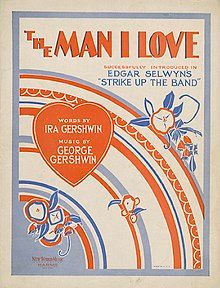
One of my enduring chuckles was hearing Humphrey Littleton on I’m Sorry I Haven’t a Clue refer to George Gershwin and his sister Ira. There was subdued laughter, unusual for that show, as most of the audience accepted this as fact and could not see a joke. Ira was, of course, George’s elder brother. Ira was a master wordsmith and George wrote the music. If it wasn’t for Ira, George would possibly still be plugging songs in Tin Pan Alley. They teamed up in 1924 and produced the musical Lady Be Good. It was a success running for 330 performances on Broadway and 326 in the West End. Fascinating Rhythm was written for this show.
One of their most successful songs, in fact some regard it as their finest, was The Man I Love written for Adele Astaire (Fred’s elder sister) who gave the first live performance in 1924 and the first recording was by Marion Harris in 1927. Ira clearly thought this song important as he opened his book, Lyrics on Several Occasions, with a discussion of it.
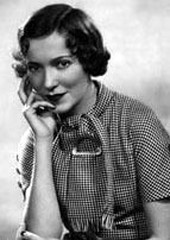 | 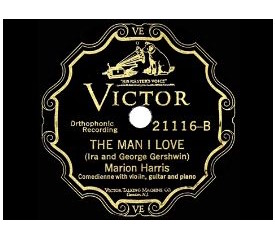 | 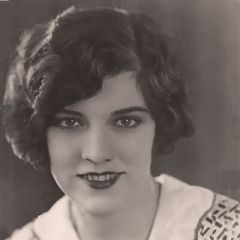 |
| Adele Astaire | The first recording | Marion Harris |
You can hear Marion Harris’s 1927 recording here – it sounds surprisingly good.
The Man I Love was incorporated into the show Lady, Be Good with Fred and Adele Astaire. Ira says that Adele sang charmingly but the song did not bring in the usual applause given to such numbers so it was withdrawn after the first week. The other songs in the show were strong enough that it survived the loss. Lady Mountbatten approached George for an autographed copy of the song and returning to London she asked the Berkeley Square Orchestra to include it in their performances. Then other bands picked up the tune (by ear, according to Ira, as the sheet music had yet to be published). The tune was also taken over to France. As Ira complained, lots of performances but no sales!
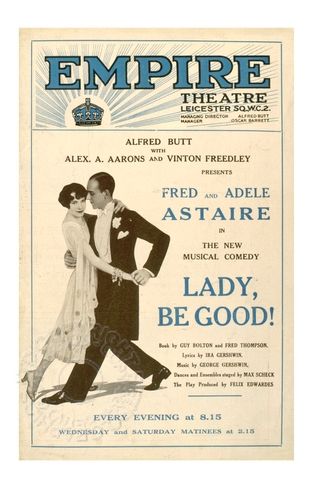
Fortuitously Edgar Selwyn, the theatre and film producer, had tickets for the RMS Titanic in 1912 but decided he would rather hear the reading for a new play in Paris so did not embark on that fated voyage. Therefore in 1927 he was able to produce George and Ira’s musical Strike up the Band. He arranged for The Man I Love to be included in that show. Strike up the Band was a rather silly affair about a Cheese magnate going to war with Switzerland. So, to quote Ira, The Man I Love was ‘again havened between footlight and backdrops’. But the show was not successful and folded in a couple of weeks. The Man I Love still did not have a home. The subsequent film bore no relation to the show apart from the Title tune.
Ziegfeld, the Broadway entrepreneur, was working on Rosalie and George and Ira had written some songs for that. The star was to be Marilyn Miller and Ziegfeld wanted The man I love included for her. Ira made some changes to the song to make it fit the musical but it never appeared in it and The Man I Love was orphaned again. It was recued by Gershwin’s publisher who thought it was a potential hit and he persuaded the Gershwins that if they cut their royaly payment from six cents to five cents the money saved could be used to publicize the song as a stand-alone score. Within six months one hundred thousand copies of the sheet music were sold and eventually dozens of recordings were made and the song entered the pantheon of the American Songbook.
The Song
The song is in two parts: Verse and Refrain, which Ira was subsequently to adopt in other songs. George was playing around with some ideas based on the opening motif of Rhapsody in Blue which he had just finished. The verse sets the scene. She is desperate for love and dreaming of her Prince Charming and although she realises that Prince Charmings rarely appear she is convinced that hers will come along – ‘the he for me’.
When the mellow moon begins to beam,
Ev’ry Night I dream a little dream:
And of course Prince Charming is the theme:
The he
For me
But this lady is no fool and realises it is just a dream
Although I realise as well as you
It is seldom that a dream comes true,
but she has hope
To me its clear
That he’ll appear
By now Ira has insiduously drawn us in. We are invested in this young lady.
Listen to Marion Harris sing the verse:
We now get the refrain where we learn of her yearning for the love of this stranger
Some day he’ll come along
The man I love;
George makes it the more poignant by the use of the minor key harmony
And he’ll be big and strong,
The man I love;
And when he comes my way,
I’ll do my best to make him stay.
The rather lilting rhythm gives way at to make him stay which is played much more slowly and the singer’s voice descends and is best expressed by a dark, creamy elegant voice such as Ella Fitzgerald’s. But I cannot give you an example of that because it would seem Ella did not include the verse in her recordings but only the refrain. Listen:
I cannot understand why such a renowned singer would do this.
Then her imagined man becomes ever more real
He’ll look at me and smile –
I’ll understand
And in a little while
He’ll take my hand
And though it seems absurd,
I know we both won’t say a word.
Ella Fitzgerald is superb with her deeply resonant voice. She lowers her register and slows for ‘won’t say a word’.
Emboldened in her thoughts she tries to decide exactly when she will see him. The whole phrase lightens even though most of it is in the minor key.
Maybe I shall meet him Sunday,
Maybe Monday – maybe not;
Still I am sure to meet him one day –
Maybe Tuesday
Will be my good news day
In her book Fascinating Rhythm (p69-70), based on extensive interviews with the Gershwins, Deena Rosenberg beautifully encapsulates the changing emotions:
‘As steadily and inexorably as the descending harmony, Ira’s lyric invests the singer’s quest with ever greater seriousness, without once exceeding the limits of the character’s own verbal or mental capacities. It is George and Ira’s ability to treat a lyric as an unfolding drama that enables them to raise the stakes as they go – in this case, stating the fantasy in the first section of the refrain, investing it with immediacy in the second and with depth in the fourth. Octaves in the accompaniment signal the climax of the song as the lyrics round out the mini-scenario. The search is revealed as a search for a home and security’:
He’ll build a little home
Just meant for two;
From which I’ll never roam –
Would you? Would you?
Until now we have been outsiders looking in on this little story but now it is abruptly brought home by aiming it directly at us: ‘Would You?’ ‘Would you?’ Of course we would, and in believing in her song it gives her a sense of repose and fulfilling acceptance:
And so all else above,
I’m waiting for the man I love.
The Man I Love is considered to be one of the greatest songs of the twentieth century and it is always in my mind – a little ear worm.
Len Mullenger
Recordings
Marion Harris from a Victor 78. 21116-B
Ella Fitzgerald from Ella Fitgerald sings the George and Ira Gershwin Song book, Music arranged and conducted by Nelso Riddle Verve 825 024-2 ( although it has been through many iterations)
Books
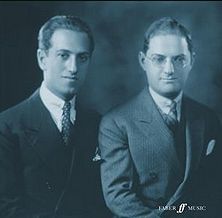
Lyrics on Several Occasions
by Ira Gershwin, Gent. (1959)
Selection of Stage and Screen Lyrics
Written for Sundry Situations; and
Now Arranged in Arbitrary Categories
To Which Have Been Added Many
Informative Annotations &
Disquisitions on Their Why &
Wherefore, Their Whom – For, Their
How: and Matters Associative

Fascinating Rhythm – The Collaboration Of George And Ira Gershwin
by Deena Rosenberg, Lime Tree Press (1991)


















